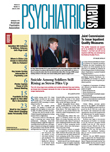Anew epidemiologic study adds to the growing body of evidence that points to genetic or familial factors in the etiology of autism. Children with autism are more likely than children without autism to have at least one parent who has been hospitalized for any psychiatric disorder, the study found. Noteworthy is the finding that schizophrenia in either parent or depression and personality disorders in mothers but not fathers appear to be linked to higher risk of autism in their children.
Julie Daniels, Ph.D., M.P.H., an assistant professor of epidemiology at the University of North Carolina School of Public Health, and colleagues searched data from the Swedish birth registry and compared 1,277 children diagnosed with autism with 30,693 matched controls without autism, all of whom were born between 1977 and 2003. The authors then found the hospital records of these subjects' parents in the Swedish national health care registry and searched for data on the parents' hospitalization for any psychiatric disorders beginning in 1973.
The autistic children were more likely than nonautistic children to have at least one parent with a history of hospitalization due to any psychiatric disorder; this difference was statistically significant with an odds ratio of 1.7 (95 percent confidence interval: 1.5 to 2.0). Schizophrenia in either parent was more frequently seen in children with autism than in controls. Depression and personality disorders in mothers—but not fathers—were also associated with greater risk of autism in children, the authors concluded.
The study was published in the May Pediatrics. It was funded in part by the Centers for Disease Control and Prevention.
Every Swedish resident is given a unique identification number at the time of birth or immigration, and all health care services are recorded in national registries and databases with this identifier. This system allowed the researchers to link 99 percent of the children to their parents' medical records and study a relatively homogenous population in terms of racial and ethnic composition.
The link between autism and parents' psychiatric disorders seems consistent with other genetic or familial research in autism. In a recent, previously reported study, one mutation that disrupts normal gene sequences through structural errors in the chromosomes, was found to occur more frequently in both autism and childhood-onset schizophrenia by separate groups of researchers (Psychiatric News, May 2).
“The study results are very modest, and the level of association [the authors found] is quite low,” said Gary Goldstein, M.D., president and chief executive officer of the Kennedy Krieger Institute, which treats and studies children who have autism or other developmental disabilities. He believes the findings should be viewed with caution.
“We have to be very careful not to confuse schizophrenia and autism because they are clinically distinct disorders,” Goldstein added.
Goldstein pointed out that although recent studies have found more genetic risk factors for autism, each of these risk factors is present in a fraction of all patients. This study, he noted, is further limited by the fact that the diagnoses of psychiatric disorders and autism were extracted from hospitalization data without confirmation of clinical diagnosis. It is difficult to determine whether a more complete dataset including outpatient diagnoses and treatment would change the conclusions.
“We know there are multiple risk factors for both psychiatric disorders and autism. The link may be common genetic risk factors or environmental factors,” Goldstein said. “The whole family may have been exposed to the same environmental factors that led to the increased diseases.”
In their publication, Daniels and coauthors brought up a hypothesis that“ there is a familial predisposition, perhaps genetic, that presents differently in the parent than in the child and probably requires a constellation of other genetic or environmental factors for expression.”
Although the hunt for the cause of autism is still in the early stages, many researchers now believe that the disorder arises from exceedingly complicated interactions among multiple genetic vulnerabilities in addition to environmental risk factors. “Autism is not a simple genetic disease, even though we have found powerful genetic predispositions,” Goldstein commented. “Familial clustering of autism and psychiatric disorders may have to do with genes, diet, environmental factors, or all of them. This study is just a little piece of the puzzle.”
An abstract of “Parental Psychiatric Disorders Associated With Autism Spectrum Disorders in the Offspring” is posted at<pediatrics.aappublications.org/cgi/content/abstract/121/5/e1357>.▪
